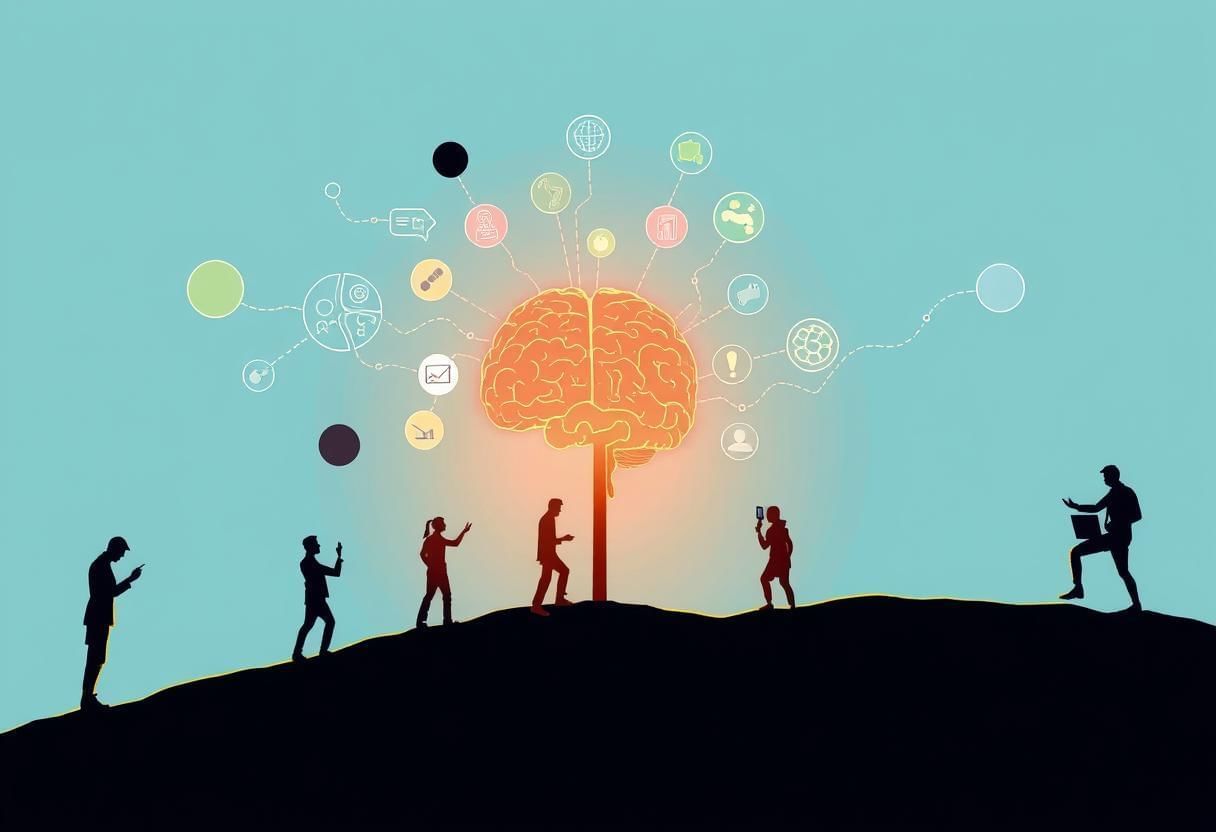Intelligence and Achievement Chapter Notes | AP Psychology - Grade 11 PDF Download
| Table of contents |

|
| Introduction |

|
| Theories of Intelligence |

|
| Intelligence Measurement |

|
| Systemic Issues in Intelligence Testing |

|
Introduction
Intelligence is a multifaceted concept that shapes how we learn, solve problems, and achieve in various domains. This chapter explores different theories of intelligence, from general ability to multiple distinct skills, and how they are measured through standardized tests. It also examines the evolution of intelligence testing, the impact of cultural and environmental factors, and the ethical challenges of test misuse. Additionally, the chapter distinguishes between achievement and aptitude tests and highlights the role of mindset in academic success, emphasizing the importance of a growth mindset for resilience and learning.
Theories of Intelligence
Historically, intelligence was often assessed through simplistic and biased approaches. However, modern perspectives embrace a more comprehensive understanding, acknowledging the influence of cultural, environmental, and emotional factors.
- Late 19th century: Emergence of scientific methods to study intelligence.
- Shift from subjective evaluations to standardized testing protocols.
- Increased awareness of how environment and culture shape intellectual outcomes.
Today, intelligence is viewed as multifaceted, encompassing cognitive, emotional, and social dimensions, with environmental factors playing a significant role in its development.
General ability vs multiple abilities
The discussion over general versus multiple intelligence theories continues in psychology. Three key viewpoints offer insight into the various ways intelligence is understood:
Spearman’s General Intelligence (g Factor)
- Proposes a general intelligence (g factor) influencing all mental tasks.
- Includes specific abilities (s factor) for particular tasks.
- Example: A student excelling in math and language arts likely has strong g factor.
Gardner’s Multiple Intelligences
- Howard Gardner’s theory posits that intelligence comprises eight independent capacities, each operating distinctly.
- For example, a talented dancer may excel in bodily-kinesthetic intelligence but struggle with logical-mathematical tasks, illustrating the independence of these abilities.
- Gardner’s eight intelligences include:
- Linguistic: Mastery of language, seen in writers and orators.
- Logical-mathematical: Proficiency in logic and numbers, common among scientists.
- Spatial: Ability to visualize and manipulate spatial relationships, vital for architects.
- Musical: Sensitivity to rhythm and sound, displayed by musicians.
- Bodily-kinesthetic: Control over physical movements, found in athletes.
- Interpersonal: Skill in understanding others, characteristic of leaders.
- Intrapersonal: Deep self-awareness, seen in philosophers.
- Naturalistic: Ability to classify natural phenomena, demonstrated by ecologists.
Sternberg’s Triarchic Theory: A Middle-Ground Approach
- Sternberg’s Triarchic Theory describes intelligence as consisting of three connected abilities: analytical, creative, and practical.
- Example: A student may:
- Score well on tests (analytical)
- Create a unique science project (creative)
- Know how to motivate peers (practical)
- The theory offers an explanation for why some individuals succeed in academics but may not perform as well in real-life situations, and vice versa.
- Sternberg’s theory bridges the gap between:
- Spearman’s idea of a single general intelligence
- Gardner’s concept of multiple intelligences
- It does this by:
- Accepting multiple types of intelligence (like Gardner)
- Treating them as linked, not completely separate
- Focusing on three main types rather than many
- Highlighting the importance of practical use in daily life
- The three intelligences in Sternberg’s model:
- Analytical: Ability to think critically, compare, and solve academic problems
- Creative: Ability to come up with new ideas and imagine unique solutions
- Practical: Ability to apply knowledge in everyday situations and adjust to real-world challenges
Intelligence Measurement
Evolution of IQ Tests
Intelligence testing has evolved from rudimentary comparisons of mental and chronological age to sophisticated, standardized assessments. Modern tests emphasize:
- Consistent administration and scoring procedures.
- Age-specific normative comparisons.
- Evaluation of multiple cognitive domains.
- Sensitivity to cultural differences.

Note: Labeling cognitive abilities/disabilities is outside the AP Psychology Exam scope.
Psychometric Foundations
- Standardization ensures consistent test administration, environments, and scoring.
- Validity ensures tests measure intended constructs:
- Construct validity: Reflects the theoretical concept of intelligence.
- Predictive validity: Predicts future performance accurately.
- Content validity: Covers the full domain being measured.
- Concurrent validity: Correlates with other established measures.
- Reliability ensures consistent results across:
- Test-retest reliability: Same person, multiple tests.
- Alternate-form reliability: Different test versions.
- Inter-rater reliability: Different scorers.
- Normalization converts raw scores to standardized metrics for comparison.
- Test norms need regular updates to reflect population changes.
Socio-Culturally Responsive Assessments
- Modern testing recognizes cultural context in outcomes.
- Environmental factors impact performance: language differences, cultural familiarity, and educational opportunities.
- Psychological influences include:
- Stereotype threat: Anxiety from negative group stereotypes impairs performance.
- Test anxiety: Affects performance regardless of ability.
- Cultural familiarity with test formats advantages certain groups.
- Culturally responsive practices use careful test selection, modified procedures, and contextual interpretation.
Systemic Issues in Intelligence Testing
Testing faces challenges from societal and methodological factors.
The Flynn Effect and societal factors

The Flynn effect reveals a steady rise in IQ scores over generations, with global increases of about 3 points per decade in the 20th century.
There's many reasons for this:
- Improved nutrition and healthcare, supporting brain development.
- Better access to education, fostering abstract thinking.
- Increased environmental complexity, enhancing cognitive skills.
This phenomenon underscores the malleability of intelligence and its responsiveness to social conditions.
Group Differences in IQ Scores
- Explaining group differences in intelligence test scores needs a careful look at social and testing-related factors, not just biological explanations.
- Social influences create unequal chances for development, such as:
- Differences in education access across communities and income levels
- Economic conditions affecting nutrition, healthcare, learning materials, and enrichment
- Healthcare quality influencing brain development and function
- Testing issues make interpretation more complex:
- Tests may contain cultural content that favors those with backgrounds similar to the test designers
- Language differences can cause unfair score gaps not related to actual intelligence
- Unfamiliar or stressful testing environments can lower performance
- A thoughtful and responsible approach avoids blaming group differences on genetics and instead:
- Acknowledges how social and testing factors affect results
- Notes that when environmental conditions are made equal, performance differences between groups shrink significantly
Misuses of Intelligence Testing
- The misuse of intelligence tests in history has caused major harm, showing the ethical responsibility involved in using cognitive assessments.
- Learning from past mistakes is essential to avoid repeating harmful practices.
- Intelligence tests have been wrongly used to:
- Justify discrimination against marginalized communities, often by ignoring social and environmental influences on scores
- Limit education access, where test scores alone kept capable students out of advanced programs and colleges
- Restrict immigration, especially when tests were given in unfamiliar languages, unfairly disadvantaging newcomers
- Make employment decisions based on intelligence scores, creating barriers that didn’t reflect real job ability
- These misuses show why it’s critical to follow ethical testing practices, like:
- Choosing tests that suit the situation
- Considering the full context of the individual’s background and opportunities
Achievement vs. Aptitude Tests

- Academic success depends on many factors beyond general intelligence, like motivation, study habits, and the quality of education — and maybe even if “Cram Mode” is on (humorously noted).
- Understanding the difference between achievement and aptitude tests helps clarify their unique purposes:
- Achievement tests:
- Measure what students have already learned in school
- Focus on subjects like math, reading, and science
- Reflect learning experiences, including quality of teaching and curriculum exposure
- Help assess current knowledge and identify areas that may need improvement
- Aptitude tests:
- Predict future learning ability
- Assess skills like reasoning, problem-solving, and processing information
- Do not test specific subject knowledge but instead look at general cognitive potential
- Help identify students who may need extra support or advanced challenges
- In summary:
- Achievement tests show what a student knows now
- Aptitude tests suggest how well a student might learn in the future
- Both are useful for educational planning and program evaluation
Fixed vs. Growth Mindset

- A person's beliefs about their own abilities—known as their mindset—strongly affect how well they learn and perform in school.
- Carol Dweck’s research shows that students’ views of intelligence shape their academic behavior and success.
- Growth mindset traits help promote learning and resilience:
- Seeing challenges as chances to grow, not threats to self-worth
- Learning from mistakes by reflecting and adjusting strategies
- Believing that effort leads to mastery, not a sign of weakness
- Welcoming feedback to find ways to improve
- Fixed mindset traits can hold back achievement:
- Avoiding difficult tasks to hide possible weaknesses
- Quitting quickly when faced with obstacles
- Thinking effort means you're not smart
- Rejecting helpful feedback
- At Fiveable, there's strong support for the growth mindset:
- The belief is that anyone can learn anything with time, effort, and practice
- Even though AP exams are tough, students can succeed by staying committed, learning from mistakes, and understanding that the brain can grow and change through experience
|
35 docs
|
FAQs on Intelligence and Achievement Chapter Notes - AP Psychology - Grade 11
| 1. What are the main theories of intelligence evolution discussed in the article? |  |
| 2. How has intelligence testing developed over time? |  |
| 3. What societal factors influence intelligence testing? |  |
| 4. How does intelligence relate to academic achievement? |  |
| 5. What criticisms exist regarding intelligence testing? |  |














